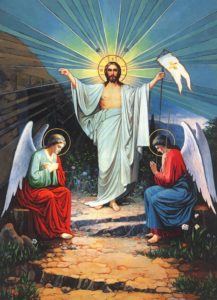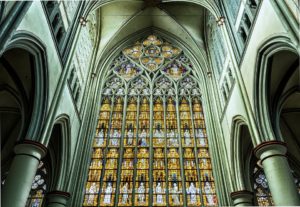An apostle is a person in whom Christ placed the responsibility of disseminating the primary principles of his teachings. Jesus’ teaching consisted essentially of social justice and peace everlasting in the Kingdom of heaven for the faithful. The core principles of his message formed the foundation for the doctrine of the early church, which he transferred to his Twelve Apostles for the purposes of maintaining unity, ensuring the preservation of his mission, and perpetuating his teachings. After carefully selecting those apostles among his followers, Jesus entrusted them with perhaps the most transcendental duty in the history of mankind.
The mission of the apostles was not only to work on the ministry of the Gospel, meaning the dissemination of the message of Christ, but also to serve as living proof to the deification (the deity) of the resurrected and living Christ. The commissioning of the Twelve Apostles during the ministry of Jesus is recorded in the Synoptic Gospels. Peter, the Apostle Jesus is said to have hand-picked to lead His Church (Jesus’ mission) is referred to as Apostolic Father.
 The Apostles’ Creed, which is at the center of worship rituals in the Roman Catholic Church, is said to have been composed by the apostles themselves. The twelve apostles are used interchangeably by some as the Disciples of Christ. However, as Disciples, they were followers of Jesus and apprentices, while as commissioned Apostles, Jesus passed onto them the responsibility of spreading the Good News (The Gospel) for perpetuity. In effect, the original Apostles had become the first missionaries for the new Church.
The Apostles’ Creed, which is at the center of worship rituals in the Roman Catholic Church, is said to have been composed by the apostles themselves. The twelve apostles are used interchangeably by some as the Disciples of Christ. However, as Disciples, they were followers of Jesus and apprentices, while as commissioned Apostles, Jesus passed onto them the responsibility of spreading the Good News (The Gospel) for perpetuity. In effect, the original Apostles had become the first missionaries for the new Church.
Following the death and resurrection of Jesus, the apostles traveled through Mesopotamia and Rome to spread Jesus’ message of healing, salvation, faith in One Lord and Savior, and the hope of everlasting peace in the Kingdom of Heaven. This early period of Christianity is called the Apostolic Age. Through the 2nd. Century, association with the Apostles was viewed as evidence of authority, therefore apostolic activities were held in high esteem, and churches that were associated with the Apostles were called “Apostolic Sees.” In that context, Paul’s epistles came to be accepted as scripture, along with two of the four Gospels by Matthew, Mark, Luke, and John. The first Gospel of the New Testament formed the earliest documented accounts of Jesus’ life and death. Those Gospels have been attributed to Matthew. Various Christian texts, including the New Testament and the Didache, as well as the Apostolic Constitution, were also attributed to the apostles. Restricted usage of the word apostle appears in the Book of Revelation. While Apocryphal writings include the 3rd. and 4th. Century Acts, as well as the Gospel of Thomas.
Jesus Commissioned His Twelve Apostles
According to the Gospel of Luke, Jesus went up to the mountain to pray on the day. In the morning, he came down the mountain after a night of prayer and called his disciples who were his followers, and chose twelve of them. In effect, that morning Jesus commissioned those twelve men to learn his teachings (the Gospel) and become his messengers (his apostles). They were Simon whom Jesus renamed Peter, and later before his death, Jesus told, “you are the Rock (CEPHAS) and on this rock I build my Church,” Jesus’ brother Andrew, James, Philip, John, Bartholomew, Thomas, Matthew, James (the son of Alpheaus), Simon who was called the Zealot, Judas son of James, and Judas Iscariot who became the traitor that sold Jesus to the Jews for some pieces of gold coins. Several of Jesus’ apostles, including Simon, Peter, and Andrew were respectively a fisherman and a son of a fisherman, and in the Gospel of Matthew, the commissioning of the twelve apostles took place shortly before the miracle of the man with a withered hand. In the Gospels of Mark and Luke, Jesus’ commissioning of the apostles appears shortly after that miracle. It is widely accepted by scholars that the apostles independently wrote several parts of the Gospel, with the Book of Revelation attributed to John’s writing. The differences in writing styles and recollection may explain some of the minor discrepancies in the various representations and accounts we find in the Gospel about Jesus’ life and teachings.
The Gospel
The word Gospel is generally defined as the proclamation of “Good News.” This can include the prediction, announcement, or dissemination, of the positive events of public importance. It can also relate to the deification of a king, the accession of an emperor, or victory in battle. Historians and scholars of antiquity have suggested that such proclamation of good news was often an occasion for a thanksgiving sacrifice and a festival, with the bearer of such Good News being given a reward. But in earnest, the commission of the twelve Disciples as Apostles of the Good News (Jesus’ message of the love of the Heavenly Father for all, the resurrection of the dead, and the forgiveness of sin) transcended both the original meaning of the word, as well as its usage, as it came to include the proclamation of Christ as the Lord and Savior, following the crucifixion, the resurrection, and the ascension of the risen Christ.
The Fate of the Twelve Apostles
After Jesus’ death and resurrection, and following His ascension into heaven, the Apostles began the mission that Jesus delegated to them in earnest. In addition to obligation and duty, they were armed with a solid purpose grounded in faith and conviction in the pursuit of their mission to build Jesus’ Church. As they traveled, they attracted new followers, made converts, and recruited new disciples. It can be credibility speculated that this aspect of their work occurred as a matter of course, necessity, and in anticipation that they, too, might at some point meet a similar fate to that which ended the lives of John and Jesus. The following list vindicates their anxiety.

• SIMON (Peter the Rock} and Paul made it to Rome, where Bible historians believe Peter became the first bishop. Both apostles may have been executed in 64 AD. However, the records appear more definitive that Paul was executed by crucifixion. The St. Peter Basilica in Rome was built over his grave.
• ANDREW (Brother of Simon) was originally a disciple of John the Baptist. According to scholarly literature, after the death and resurrection of Jesus, Andrew traveled to Achaia a region in southern Greece. He also traveled to Scythia (Ukraine and southern Russia). It is in that region that he was crucified and became the patron saint of Russia.
• JAMES (not the son of Alphaeus): During widespread persecutions by Herod Agrippa I, King of the Jews, James was beheaded by the sword.
• JAMES (son of Alphaeus) preached the Gospel in Jerusalem and Judea, now modern Israel, where he was put to death.
• JAMES (the brother of John) was executed by the sword during the great famine, sometimes around 44 AD, when King Herod escalated the persecution on members of the new Church.
• JOHN (brother of James and son of Zebedee): According to the Gospel of John (19:26-27), John, son of Zebedee took Mary, the mother of Jesus as his adopted mother. He preached in Jerusalem and later became a bishop of Ephesus, in western Turkey. Sometimes between the reigns of either Emperor Nero, between 54 and 68 AD, and the Domitian (86-96 AD), he was banished to the nearby island of Patmos and subsequently freed, but died of natural causes at Ephesus in 100 AD.
• PHILIP (not Philip the Evangelist or the “deacon” who preached to the people of Samaria) preached the Gospel in Phrygia west-central Turkey before he was martyred in Hieropolis.
• BARTHOLOMEW (Nathanael) met martyrdom through his link with Armenia (present-day Armenia, eastern Turkey, northern Iraq, and northwestern Iran) and also in India. He also did missionary work in Egypt, Arabia, Ethiopia and Persia (today’s Iran). In the available literature, he was flayed or skinned alive and then beheaded in Derbent near the Caspian Sea.
• THOMAS DIDYMUS (Doubting Thomas) preached the Gospel in Parthia, which included modern Iraq and Iran, and possibly in southern India. History has it that he was spared death near Madras. There is evidence that Mount St. Thomas near Madras is associated with his name.
• MATTHEW (Levi – Tax-Collector/Publican: After preaching in Judea, some accounts place him doing missionary work in Ethiopia and Persia, where he possibly died a martyr.
• JAMES (Son of Alphaeus – not to be confused with Judas son of James and Jude the brothers of Jesus, or James father of Judas- not Judas Iscariot or James the son of Zebedee: Scholarly research placed James working in Palestine, today’s Israel, before preaching and being martyred in Egypt.
• JUDE (Thaddaeus) not Jude the brother of Jesus, is known to have preached in Assyria (eastern Iraq) and Persia – now Iran- before joining with Simon the Zealot, and both were killed in Persia.
• SIMON “THE ZEALOT” (Patriot also known as the Cananaean) who may have earned the title “zealous” due to membership in the Jewish revolutionary movement known as Zealots, was known to have preached in Egypt and then traveled with Jude to Persia, where both met martyrdom. Simon may have been crucified or hacked to death.
• JUDAS ISCARIOT: In Matthew 27:3-10, it is written that: “Then (as Jesus was being handed over to Pilate) Judas, who had betrayed him, saw that he was condemned, he hang himself, after he tried to return the coins to the Jewish Elders in remorse, but when he said, “I was wrong – I have betrayed an innocent man to death,” the Elders replied, “And what has that got to do with us?” they replied. “That’s your affair.”
• MATTHIAS had been a disciple of Jesus from his Baptismal to his resurrection. He was chosen to replace Judas Iscariot as the twelfth apostle. He was martyred in Ethiopia, Judea, or “Cappadocia” in eastern Turkey in the area of the Caspian Sea.
• PAUL (Saul of Tarsus) traveled widely and made at least three major missionary journeys. He wrote many letters of which thirteen still exist. Upon returning to Jerusalem, he was arrested and tried. He was later executed and beheaded in Rome in 67 AD.






